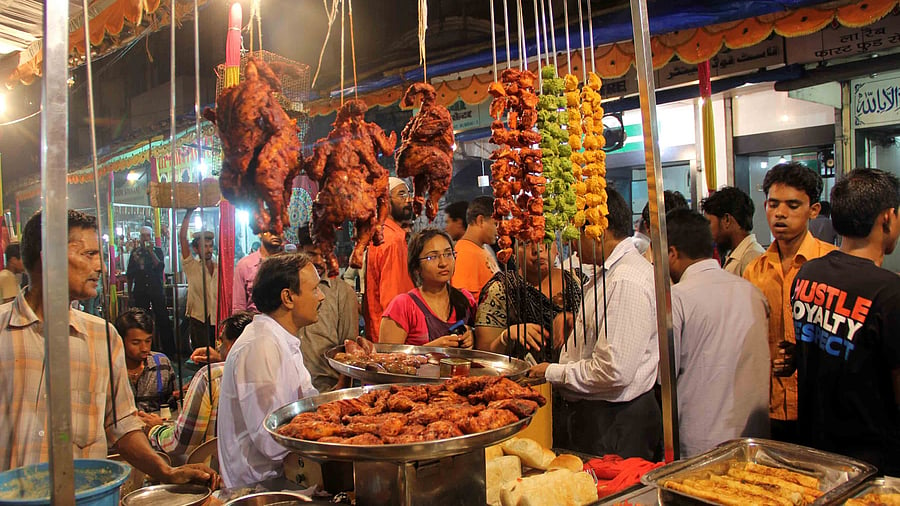
Doctors warn consuming food items made with unapproved dyes can lead to acute health issues.
Credit: DH File Photo
Bengaluru: Last March, the Karnataka government banned the use of harmful artificial dyes in food items such as manchurian, kebab, and cotton candy due to public health concerns.
However, a reality check reveals that brightly coloured food items remain widely available in the market, raising questions about the ban’s effectiveness.
The Food Safety and Drug Administration (FDA), formerly the food safety department, tested 171 samples of gobi manchurian in state laboratories in February 2024. Of these, 107 samples were deemed unsafe due to the presence of synthetic dyes such as tartrazine, sunset yellow, and carmoisine.
Additionally, six out of 25 samples of cotton candy were found to contain traces of Rhodamine-B, an industrial dye used in textile and paper dyeing, which is carcinogenic.
In June, the government extended the ban to include vegetable, chicken, and fish kebabs and tikkas after testing 39 samples. Eight of these contained synthetic dyes such as sunset yellow FCF and carmoisine, which are known carcinogens and can cause allergic reactions if used in excess.
Health Minister Dinesh Gundu Rao had announced that violators of this ban would face a prison term of up to seven years and a fine of up to Rs 10 lakh.
Violations persist
A DH investigation found that artificial dyes are still widely used in smaller street food stalls across Majestic, Shivajinagar, Jayanagar, Koramangala, Dairy Circle, and VV Puram.
Customers in these areas have reported digestive issues and skin irritation after consuming food suspected of containing synthetic dyes, though it remains inconclusive whether the banned substances were used.
At an underground kitchen and kebab shop, food colouring was openly used.
Kamlakar, a staff member, admitted to adding colours to attract customers. "Without colour, there is no taste," he claimed, insisting that the bright appearance makes the food more appealing.
Similarly, at a small Chinese eatery known for its gobi manchurian and kebabs, artificial colour is discreetly mixed with ingredients.
Ramesh, a worker at the stall, justified its use: "We add it very lightly so that it is not visible to people."
At a hotel in Shivajinagar, customers reported cases of skin irritation and indigestion after consuming food suspected of containing artificial colouring.
Despite growing health concerns, the use of synthetic dyes remains common in the area’s eateries.
A worker at another hotel in the area defended the practice. "In the entire Shivajinagar, you won’t find a place where food is served without colour," he admitted, highlighting the widespread reliance on artificial additives despite government restrictions.
Consumer concerns grow
In Jayanagar, several bakery customers voiced concerns about artificial colouring in sweets. Many expressed a preference for homemade alternatives to avoid health risks.
"We prefer to make sweets at home because bakery products contain too much artificial colouring,” said Ramani Gowda, a customer.
Dr Mallikarjun, Head of the Department of Gastroenterology at St John's Medical College Hospital, warned that consuming food items made with unapproved dyes can lead to acute health issues. "Gastroenteritis, vomiting, pain, and bloating are all known effects of consuming such foods," he explained.
Koramangala resident Priya S experienced severe discomfort after eating a popular tandoori chicken dish from a well-known restaurant last week. She developed stomach pain, followed by skin irritation and red rashes. Doctors attributed her symptoms to artificial food colouring commonly used in restaurant dishes.
"I never thought something as simple as food colouring could make me sick,” she said. “If restaurants are using these additives, they should at least ensure they are safe. Customers deserve to know what they’re consuming."
Similarly, Pranathi Gowda, a student at Christ University, recounted an episode of food poisoning after consuming tandoori chicken from a street food stall near SG Palya. "I had continuous vomiting and felt extremely sick after eating it,” she said.
Another student, Roshan Sharma, pointed out that the issue extends beyond kebabs and cotton candy. "Now, even Korean fried chicken is loaded with artificial colour. After eating it, I suffered from stomach irritation, indigestion, and skin allergies," he said, reiterating the growing health concerns linked to food additives.
Long-term risks
Dr Mallikarjun also highlighted the potential long-term risks. "We do not yet have conclusive scientific studies on the long-term effects, but some reports suggest these dyes could contribute to pancreatic disorders," he added.
Calls for govt action
Many customers DH spoke to urged the government to take stringent action, including banning food stalls that continue to use harmful dyes.
At several gobi manchurian stalls in VV Puram, customers raised concerns about the excessive use of bright red colouring, with many avoiding the dish for their children due to health risks.
"I don’t feed my children kebabs or even gobi manchurian from outside stalls. I want to be careful,” said Praneeth Kumar, a concerned parent.
What the health minister has to say
Health Minister Dinesh Gundu Rao acknowledged the challenge of enforcing the ban and stressed the need for sustained awareness efforts.
"It is our duty to keep checking and monitoring constantly. However, people might not stop using these dyes just because of our checks; more consumer awareness and self-regulation are key. Consumers must become aware and demand more quality," he said.
He also noted the need to strengthen legal measures beyond fines, especially for repeated violations. "We will have to check if something can be seized or banned. These are legal matters," he told DH.